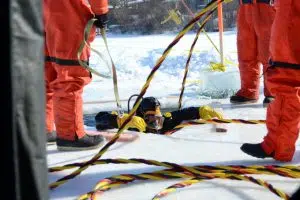They dive underwater in search for evidence — weapons, cars and even dead bodies.

Kevin Bows from Regina Police’s Underwater Recovery and Investigation Team suits up before a training exercise at Lovering Lake on Feb. 27. (Joseph Ho/980 CJME)
When Regina Police need to search a lake, they send their Underwater Investigation and Recovery Team, which has been spending this week training at Lovering Lake to get a refresh on its underwater skills.
The team consists of one diver and another on standby in case the first one needs to be extracted. Each diver will have a tender whose job is to help them put on the equipment and to provide assistance. There’s a panel operator who controls the diver’s surface oxygen supply as well as a supervisor. Regina’s team has eight members.
Before entering the water, the crew runs through a series of checks to make sure the gear’s working.
“We don’t want to miss a step because there’s so much gear and so many things that could go wrong that we want to make sure we take all the precautions we can to minimize the risk,” said Anthony Rodier.
Rodier said ice diving is more dangerous than patrolling. As his teammate Kevin Bows said, they’re entering an environment that doesn’t support human life.
“If something happens with their mask or equipment under water, they have a very short period of time — seconds — to deal with that,” Bows said.
Part of minimizing the risk includes making sure there’s redundancy built into their practices. There are multiple oxygen tanks above water and two of them must always be full when the team goes home. If something goes wrong with the surface supply, the diver also has a tank with them in the water.

A diver from Regina Police’s Underwater Recovery and Investigation Team resurfaces after a training exercise on Feb. 27. (Joseph Ho/980 CJME)
“We’ve been very fortunate that we’ve never had an actual accident take place in the water but there’s teams all across Canada and all across North America and on average, they have in the neighbourhood of three to four occupational divers die a year,” Bows said.
Once underwater, Robin Petkau described it as peaceful but nerve-racking.
“It’s dark but it’s quiet. It’s nice and peaceful. The only thing that’s a little nerve-racking is you can’t just come up anywhere,” Petkau said.
“If something goes wrong, you really have nowhere to go but getting back to the hole. You can’t just pop up anywhere.”
Rodier said applicants need their open water diving certification and then need to pass a test involving swimming, treading water and snorkeling. He said it takes four to five years to become fully certified as an occupational diver.
“It takes someone that’s meticulous … you have to be very comfortable in water, very comfortable with confined spaces going under ice,” he said.
Asked why he chose to be part of the unit, he said it’s because of the team and his love for diving.
“Part of it is the people that I work with. It’s a great group of people,” he said. “I’ve always been somebody that’s loved water.”











